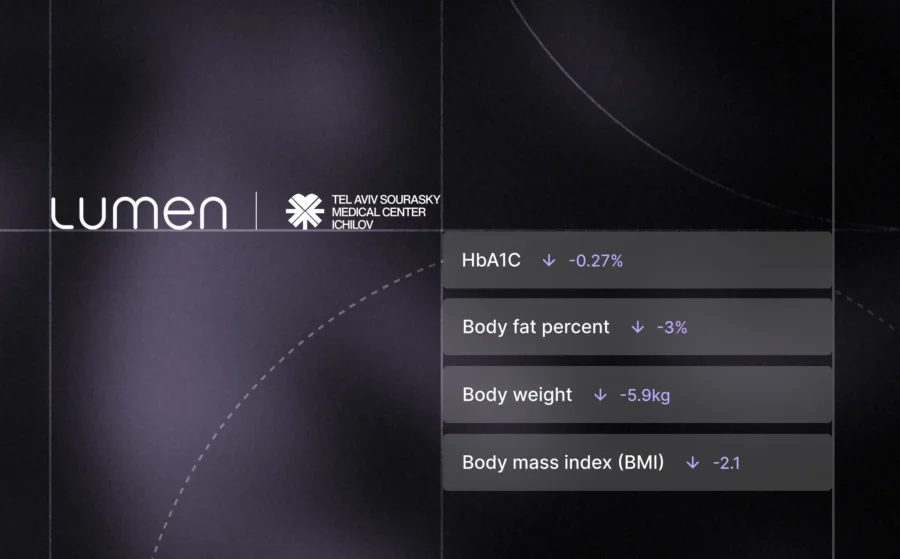The link between carb intake, BMI, and metabolic flexibility
Insights from a Lumen User Study

Analyzing the correlation between carb consumption and BMI
Lumen’s research team has published a peer-reviewed manuscript in JMIR Mhealth and Uhealth that analyzes the relationship between carbohydrate intake, BMI, and metabolic flexibility - the body’s ability to switch between carbohydrate and fat sources depending on their availability. To investigate this relationship, the Lumen device was used to measure postprandial (post-meal) carbon dioxide (%CO₂) responses as an indicator of real-time metabolic states.
The analysis included 6,207 meals with pre- and post-meal tags logged by 2,607 participants across varying BMI ranges.
The published study, led by Lumen’s team of researchers, including Drs. Shlomo Yeshurun, Tomer Cramer, Daniel Souroujon, and Merav Mor, has shown that Lumen can also measure metabolic flexibility - a capability crucial for maintaining optimal health and mitigating the risk of metabolic disorders.
The combination of BMI and what you consume in terms of low, medium, or high carbs determines your metabolic flexibility. Participants with healthier BMIs exhibited higher postprandial %CO₂ responses, indicating superior metabolic flexibility and efficiency in carbohydrate metabolism.

In contrast, those with obesity displayed diminished %CO₂ responses, suggesting reduced metabolic flexibility and inefficiency in metabolizing excess carbohydrates.
It was observed that CO₂ levels increased following a meal, peaking between 30 to 210 minutes afterward. Significant relationships between the CO₂ response to meals to the carbohydrate consumption in these meals and the users’ BMI were found. This analysis was additionally strengthened by showing that CO₂ response was higher when carbohydrate intake was higher and weakened in users with high BMI.
The study's methodology involved examining the post-meal CO₂ responses of Lumen users after consuming logged meals.
Unpacking the Findings
Accuracy of Lumen
Lumen is able to track metabolic shifts after meals, uncovering a strong correlation between carbohydrate intake and Body Mass Index (BMI).
By measuring the %CO₂ in exhaled breath, Lumen can distinguish changes in metabolic fuel usage—higher CO₂ levels indicating carbohydrate burning and lower levels indicating fat usage.
The %CO₂ in your breath reflects the fuel your body is metabolizing at that moment (carbs vs. fat, higher %CO₂ means more carbs are being burned, and lower means more fat is being burned).
Metabolic Flexibility, Carb Intake, and BMI Correlation
Participants with healthier BMIs demonstrated significantly higher efficiency in carbohydrate metabolism, indicating better metabolic flexibility. This flexibility, measured by Lumen's %CO₂ response, directly reflects the body's ability to adapt fuel sources based on dietary intake.
“The Lumen device was able to measure a difference in %CO₂ response based on the number of carbs consumed, but also based on the BMI of the user.”
Dr. Merav Mor

Why This Matters
With a staggering 88% of Americans falling into the metabolically unhealthy bracket, this research provides crucial insights into the connection between BMI, metabolic inflexibility, and, therefore, metabolic health.
The findings highlight the importance of managing metabolic flexibility in maintaining a healthy BMI and reducing the risk of insulin resistance, Type 2 diabetes, cardiovascular disease, and other metabolic disorders. Individuals with obesity may benefit from interventions that enhance metabolic health.
Metabolic health hinges on the efficiency of our mitochondria, the cellular power plants responsible for energy production. Enhancing mitochondrial function—and, by extension, metabolic flexibility—is achievable through lifestyle modifications, such as balanced nutrition, regular exercise, restorative sleep, and effective stress management.

Lumen offers an accurate, real-time glimpse into our metabolic state, empowering users to make better decisions about their lifestyle, such as boosting physical activity and adopting a well-rounded macronutrient diet, can enhance metabolic flexibility.
Personalizing nutritional intake ensures you’re feeding your body what it needs to reach your health goals. For example, understanding how different foods affect their metabolic process can encourage individuals toward dietary choices that better suit their metabolic requirements.
The Takeaway
Metabolic flexibility, the ability to switch between fuel sources, is important for overall health.
The study found that higher carbohydrate intake resulted in a higher CO₂ response. Users with high BMI showed modest responses to meals compared to those with low BMI, indicating reduced metabolic flexibility.
These findings highlight the value of Lumen in assessing postprandial metabolic flexibility and suggest that monitoring macronutrient intake can help individuals make informed dietary choices for better metabolic health.







 Digital download
Digital download 


